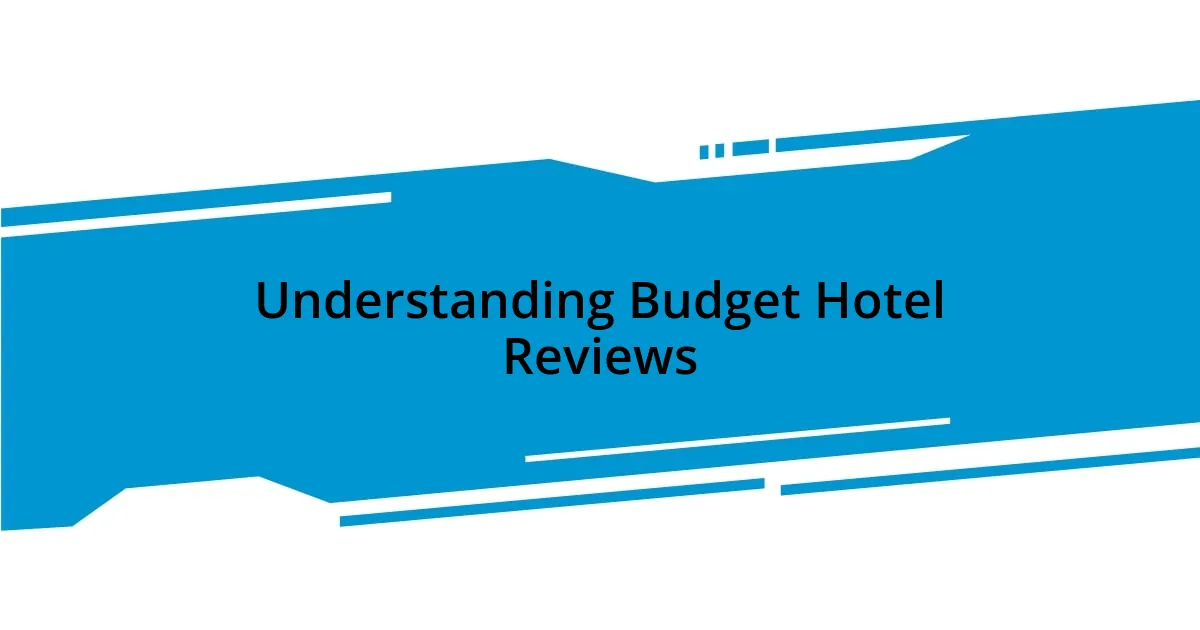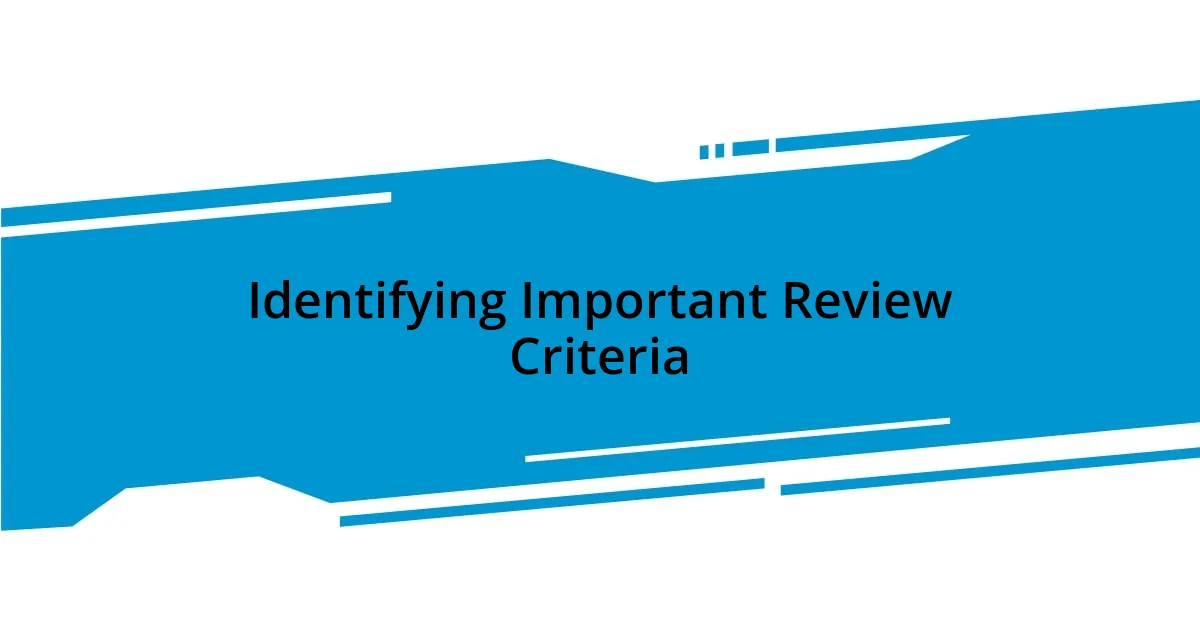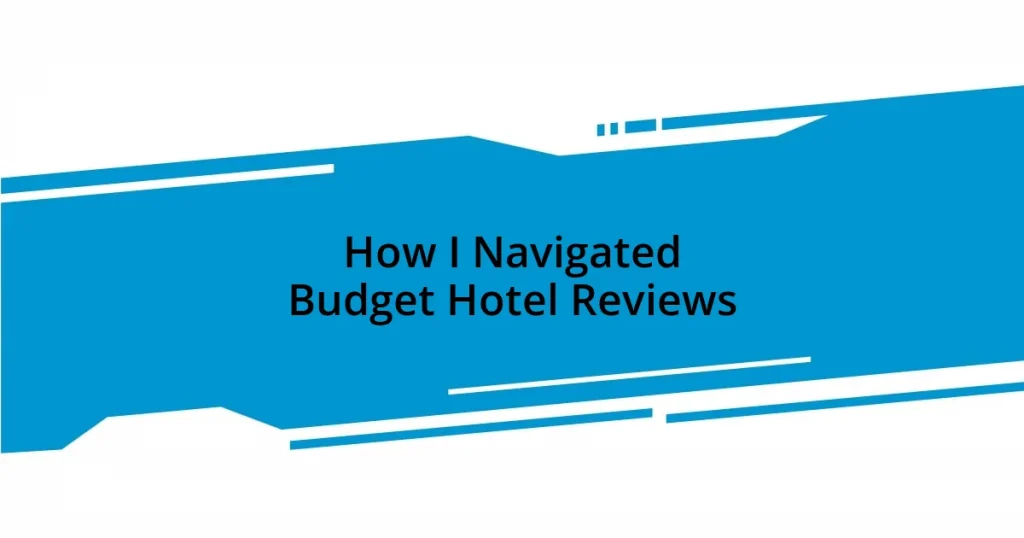Key takeaways:
- Context is essential when reading budget hotel reviews; look for patterns and recurring themes to gauge expectations.
- Key criteria for evaluating hotels include cleanliness, location, and quality of service, which can significantly impact the travel experience.
- Watch for red flags like inconsistent reviews, vague comments, and frequent mentions of management issues to avoid potential pitfalls.
- Maximizing hotel value involves balancing price with amenities, booking flexibly, and carefully checking for hidden fees.

Understanding Budget Hotel Reviews
When delving into budget hotel reviews, I find that context is crucial. For instance, I once booked a cheap hotel in a popular tourist area, only to find that the ambiance fell flat. Have you ever felt that disconnect between the glowing reviews and the actual experience? It’s all about examining the nuances of what a “budget” truly means in that setting.
Additionally, I’ve learned to pay close attention to patterns in reviews. A few negative comments about cleanliness or noise often signal potential issues. I remember reading numerous remarks about that raucous bar next door before I booked a stay somewhere and, trust me, I’m glad I did! It’s these repeated themes that I make a point to look for; they can paint a more realistic picture than a handful of five-star reviews.
Finally, I can’t stress enough the importance of balancing expectations based on the price point. A decent budget hotel might lack luxuries, but it can still offer a cozy stay and friendly service. I recall a time when I found a hidden gem that exceeded my expectations—it was affordable, yet the staff treated every guest like family. Isn’t it fascinating how a little kindness can go a long way?

Selecting Reliable Review Platforms
When it comes to finding reliable review platforms, I strongly prefer those that maintain a balance between quantity and quality. I once relied heavily on a site that seemed popular, but most of the reviews felt generic. It’s essential, I’ve found, to look for platforms where reviewers share detailed experiences rather than just star ratings. This gives me a more authentic sense of what to expect.
Consider these tips for selecting trustworthy review platforms:
- Reputation: Check if the platform is well-known and trusted by frequent travelers.
- Filter Options: Ensure the site allows filtering reviews by relevant criteria, such as cleanliness or location.
- Detailed Reviews: Favor platforms with in-depth reviews that discuss specific experiences rather than brief comments.
- Recent Posts: Look for platforms that showcase current reviews to ensure you’re getting the latest insight.
- User Engagement: Platforms with active discussions often yield more nuanced opinions and insights.
My experience has shown me that diving deep into the details can often reveal hidden gems—or potential red flags—that a simple star rating might miss. For instance, I once found an incredible deal on a site with rave reviews, but further exploration uncovered that most guests mentioned the lack of sound insulation. That insight totally changed my decision-making process!

Identifying Important Review Criteria
Identifying the right criteria for evaluating budget hotels can significantly shape your travel experience. From my perspective, cleanliness is non-negotiable; I can vividly recall checking into a hotel that looked great online but was covered in dust. My immediate reaction was disappointment, and it made me realize that even an excellent deal isn’t worth it if the basics aren’t met. I look for reviews that specifically mention cleanliness to gauge what I’m getting into.
Next, I’ve found that assessing the location is equally vital. A lovely hotel in a noisy neighborhood can turn a vacation into a headache. On one trip, I stayed in a budget hotel that seemed perfect until I discovered it was right next to a busy road. Reading reviews that highlighted such factors was a game-changer for my future bookings. It might seem simple, but understanding the surrounding environment can make all the difference in your stay.
Lastly, the quality of service can markedly elevate or detract from your experience. I’ll never forget a particularly warm welcome at a budget hotel where the front desk staff went above and beyond. It wasn’t fancy, but the staff made me feel valued. Diving into reviews that discuss the staff’s engagement and attitude helps me find those hidden gems, ensuring I’m not just saving money, but also enjoying my stay.
| Criteria | Importance |
|---|---|
| Cleanliness | Non-negotiable for a pleasant experience |
| Location | Crucial for convenience and comfort |
| Quality of Service | Elevates overall satisfaction |

Analyzing Guest Feedback Patterns
Understanding guest feedback patterns can truly transform how I perceive hotel reviews. One significant approach I’ve adopted is looking for recurring themes in the comments. For instance, when I stumbled upon a hotel that had numerous glowing remarks about its breakfast, I took note. It wasn’t just a few enthusiastic guests; it was a consistent topic across various reviews. This repetition often highlights strengths that might not come through in isolated comments.
I also pay close attention to the negative feedback because that’s where the real cautionary tales lie. During one trip, I noticed several guests mentioning the uneven heating in their rooms at a particular budget hotel. At first glance, the hotel seemed like a great option, but these insights made me reconsider. I find that diving into dissatisfaction often reveals details that photos and superficial ratings won’t. Isn’t it fascinating how patterns in feedback can shield us from potential pitfalls?
Moreover, I look for emotional undertones in the reviews. It’s not just about what people say; it’s about how they felt. I remember reading a review where someone mentioned feeling “at home” at a small inn despite its dated décor. That sentiment resonated with me, prompting me to book my stay there. Positive emotions can elevate the experience beyond just the basics, making a simple place feel special. This aspect reminds me that sometimes, it’s the emotional connection in a review that really guides my choices.

Recognizing Red Flags in Reviews
One of the first red flags I look for in hotel reviews is inconsistency. If I see a range of ratings from excellent to terrible, it catches my attention immediately. For instance, on one occasion, I found a budget hotel where some guests raved about the amenities while others complained about a moldy bathroom. It made me wonder, what’s really happening behind those walls?
I also pay close attention to vague phrases in reviews. When guests say things like “it was okay” or “not too bad,” I interpret that as a potential warning sign. I once booked a hotel with too many of these ambiguous comments, and let me tell you, when I arrived, it felt more like a gamble than a getaway. Clear and detailed feedback tends to build my confidence in a place, while fuzzy comments raise my eyebrows.
Lastly, frequent mentions of management issues are a major turnoff for me. If multiple reviewers hint at rude staff or a lack of responsiveness, I know I could be setting myself up for frustration. I remember reading about a little hotel where guests reported long wait times for help. That experience shared in the reviews directly influenced my decision to look elsewhere. Who wants to feel like they’re an inconvenience during their vacation?

Maximizing Value in Hotel Choices
When maximizing value in hotel choices, I always prioritize the balance between price and amenities. I recall a time when I found a budget hotel, not the cheapest option but with complimentary breakfast and free parking. This small investment elevated my experience, allowing me to save money elsewhere. Isn’t it interesting how sometimes spending just a little more can lead to a much richer stay?
I also believe in being flexible with booking dates. I’ve often discovered lower rates during off-peak times. Once, I chose to travel mid-week instead of on the weekend, and struck gold with a beautiful room in a well-rated hotel at a fraction of the weekend price. It’s amazing how a bit of planning can significantly enhance value without breaking the bank.
Lastly, I make it a point to read the fine print on deals. One time, I was enticed by a seemingly amazing rate only to find there were hefty fees for parking and Wi-Fi. Those hidden costs can make even the best deals seem less appealing. By digging deeper, I can truly gauge the overall value, ensuring that what appears to be a great bargain doesn’t turn into a costly oversight.

Final Tips for Booking Smartly
When booking a hotel, I can’t stress enough the importance of timing your reservation. I remember a last-minute trip where I thought I was scoring an amazing deal, only to realize later that I could have saved more if I’d booked earlier. It made me wonder, how often do we sacrifice potential savings for the thrill of spontaneity? Planning ahead truly pays off, especially when special rates are in play.
Also, don’t overlook the power of loyalty programs. I was skeptical at first, but after joining a hotel chain’s program, I enjoyed unexpected perks like room upgrades and even complimentary nights. Have you ever considered how a simple membership could transform your travel experience? It might take a little time to accumulate points, but the rewards can feel like uncovering hidden treasure on your journeys.
Lastly, always keep an eye on cancellation policies. There was a time when I booked a charming budget hotel, lured by its vintage allure. But as the trip approached, my plans changed, and I faced a no-refund policy that left me feeling trapped. I learned that flexible booking options can provide peace of mind. Who wants to be locked into a decision when adventure awaits? Making sure I have that flexibility has become a top priority in my travel planning.
















